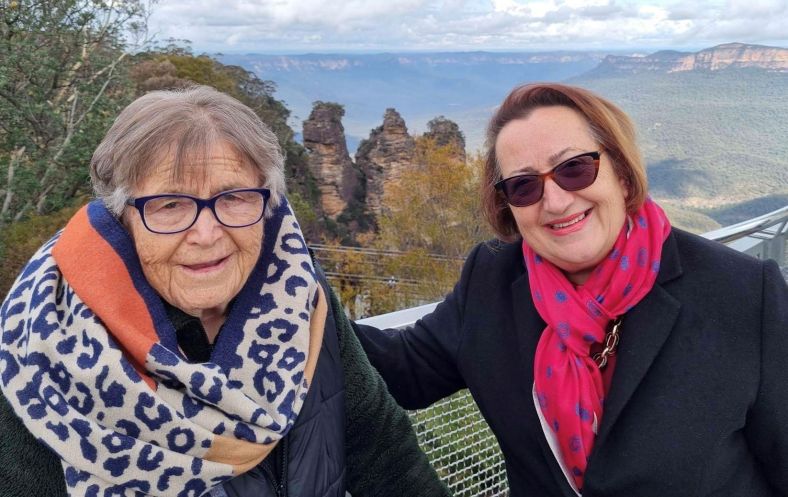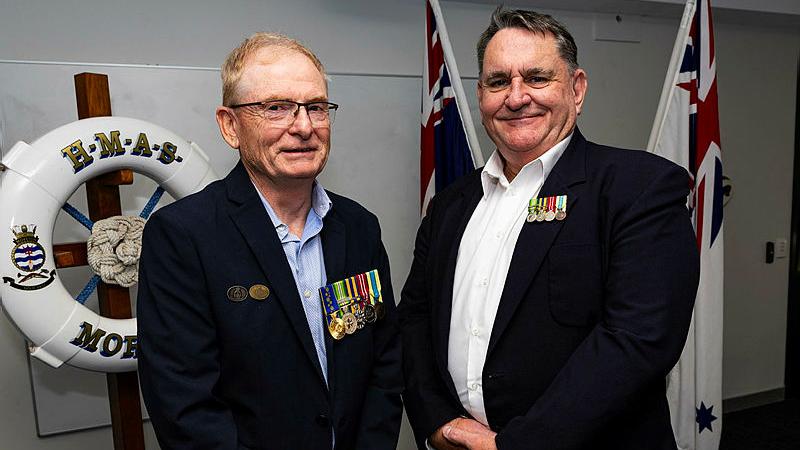Across NSW unpaid carers balance the everyday challenges of life with the care and support of their loved ones with illness, disability or frail age. This is Gordana’s story.

Ljubica and Gordana at the Three Sisters in Katoomba. Gordana is one of three sisters who care for their mother Ljubica in her home.
According to Carers NSW, over 850,000 unpaid carers across the state save the economy tens of billions of dollars each year and come from all walks of life. Beyond the statistics however, carers are our friends, family members and colleagues, each with a unique and important story.
Gordana Kostadinovska manages the Multicultural Health Service at Nepean Blue Mountains Local Health District (NBMLHD) while also caring for her eighty-seven-year-old mother, Ljubica.
Ljubica has early-stage dementia and a history of falls and hospitalisations. Gordana lives with her mum for four days each week, including over the weekends, with her sisters sharing the remainder of the care.
“I cared for both my parents until my father passed away, and for the last six and half years I’ve been looking after Mum as she has become older and increasingly frail,” says Gordana.
It’s estimated that one in four carers looks after an elderly parent, and around 70% of all carers cite family responsibility as their main reason for caring. In Gordana’s case, her carer responsibilities are also cultural.
“My parents were migrants from Macedonia in the 1970s. Because of her language, culture, and strong attachment to cultural foods, we haven’t been able to find a suitable nursing home option, so Mum really needs to be cared for at home as long as possible,” explains Gordana.
“There’s also element of cultural obligation, with children expected to care for their parents in old age.”
All carers give up something, from those who provide care twenty-four-seven to others maintaining additional responsibilities, including paid work.
“While I am proud of the care I give to Mum, it does involve a lot of sacrifice.”Gordana, working carer
“I don’t have a weekend to myself, and when I’m caring for Mum it’s very hands on. My sisters and I are united in the journey though, and family support is crucial.”
Even with support, Gordana’s carer responsibilities come with a toll on her wellbeing.
“Mum has a personal alarm so I can leave her for a couple of hours at a time, but it is always with a lot of anxiety; has she fallen? Is she able to sound the alarm?” Gordana explains.
“It’s often hard to manage, but I feel very grateful to have understanding, flexibility and support from my workplace.”
While very carer story is different, Gordana’s experience is far from unusual. According to the 2020 National Carer Survey nearly two-thirds of carers have less than ten hours per week to themselves. Additionally, more than half of all carers feel socially isolated.
“Maintaining friendships can be difficult because of the level of my responsibility as a carer,” says Gordana.
Despite the challenges though, Gordana finds reward in sacrifice.
“Mum says she’s the luckiest woman alive to have such angels looking after her, and I relish those good days – when she is content, grateful and graceful about it all,” says Gordana.
“My key message for other carers is to be kind and gentle with yourself. Gauge how much you can do for others, as well as what you need to be doing for yourself.”Gordana, working carer
Find out how you can support carers on the Carers NSW website, or find support for yourself via the Carer Gateway.
National Carers Week goes from 15 – 21 October and is a time to recognise, celebrate and raise awareness about the 2.65 million Australians who provide care and support to a family member or friend.






